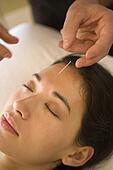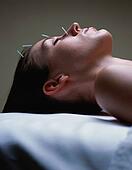
Massage
 Massage is an ancient healing art, which works on the basis that when
the body is calmed and relaxed, mental anxiety is lessened. Perhaps the
earliest mention of massage as a therapy for mental and physical stress
is found in the ayurvedic tradition of India. It is a common feature in
most of the traditional therapies. Massage has been applied daily as a
physical and mental relaxant in Indian lifestyles. In Japan, shiatsu
practitioners regularly visit people from house to house, asking
"Shiatsu today?" Acupressure is the Chinese variation of Indian marma
massage techniques, which deals with the acupoints (marmapoints) but
without the application of needles. Malay massage makes extensive use of herbal oils. Massage is urut in Malay language. The idea of massage is to relieve pain and help to revive blood circulation. During the massage, plain coconut
oil or that boiled with rempah ratus and roots is used..It is a great stress reliever and
additionally, very user-friendly.
Massage is an ancient healing art, which works on the basis that when
the body is calmed and relaxed, mental anxiety is lessened. Perhaps the
earliest mention of massage as a therapy for mental and physical stress
is found in the ayurvedic tradition of India. It is a common feature in
most of the traditional therapies. Massage has been applied daily as a
physical and mental relaxant in Indian lifestyles. In Japan, shiatsu
practitioners regularly visit people from house to house, asking
"Shiatsu today?" Acupressure is the Chinese variation of Indian marma
massage techniques, which deals with the acupoints (marmapoints) but
without the application of needles. Malay massage makes extensive use of herbal oils. Massage is urut in Malay language. The idea of massage is to relieve pain and help to revive blood circulation. During the massage, plain coconut
oil or that boiled with rempah ratus and roots is used..It is a great stress reliever and
additionally, very user-friendly.  Of late, the West has also recognized that massage could be an important
part of stress management. Oriental massage has been modified further
in the West to expand its application as a therapy.
Of late, the West has also recognized that massage could be an important
part of stress management. Oriental massage has been modified further
in the West to expand its application as a therapy.Traditionally, specific massage techniques, using hands, forearms, elbows, or even feet are applied to a patient`s body for loosening the muscles and to locate areas of tension and other soft-tissue problems. Practitioners learn to develop a sense of touch to determine the right amount of pressure on specific parts of the body.
Under severe stress, when muscles are over-worked, the body shows many weakening symptoms such as soreness, stiffness, and even muscle spasms. Heightened stress responses accumulate lactic acid in the muscle and waste air inside the body. It exhausts the body and de-motivates the mind to remain energized and active.
Why Massage is Rejuvenating:
• Massage improves circulation of blood and lymphatic fluids. Increased blood flow brings fresh oxygen to body tissues.
• Increased oxygen flow eliminates waste products from inside the body, and enhances recovery from diseases.
• Therapeutic massage boosts circulatory and immune systems to benefit blood pressure, circulation, muscle tone, digestion, and skin tone. It also improves the performance of the lungs.
• As muscle tone improves, so do the nerves that connect them, including the spinal cord, and the brain.
• Therapeutic massage can promote general well being, enhance confidence, and self-assuredness.
There are many variations of massage therapy and bodywork, which are often confused with each other. The term `bodywork` refers to therapies that combine massage, such as Shiatsu, Trager, Rolfing, Polarity, and Reflexology.
Contemporary Western massage includes methods based primarily on modern Western concepts of anatomy and physiology, using a wide variety of muscle manipulative techniques. Those are broadly used for personal growth, emotional release, and balance of mind-body-spirit. They include Esalen or Swedish/Esalen, neuromuscular massage, deep tissue massage, sports massage, and manual lymph drainage.
Massage is an excellent relaxant that also increases health and well being.
Acupressure
Acupressure is the needle-less variation of the Chinese healing system?acupuncture. When acupoints or meridians (energy pathways) become blocked or congested, a person experiences pains or discomfort on a physical level. On emotional or mental level one may become frustrated or irritable, and on a spiritual level one may experience a sense of feeling ungrounded, vulnerable, and indecisive about life.
In acupressure, practitioners use deep but gentle finger pressure on specific acupoints to release the blocked energy and to facilitate its smooth flow. In effect, this allows your body/mind to relax. As your body/mind relaxes, you have an opportunity for mindful exploration of your disturbing thought patterns and memories. You may find space to transform your belief systems that are troubling you. This way you experience less discomfort and stress in addition to an elevated sense of well being.
Acupressure is, perhaps, the most convenient as well as a skillful healing art for stress and a host of related diseases. It is convenient because it can be applied anywhere? in workplaces, on transition or at home, whenever the exigencies arise. It is all about acquainting yourself with the important acupoints, and learning the skill of using your fingertips to put the required amount of pressure on them.
Acupressure has been found to be extremely helpful in the following stress induced disorders:
• The relief of daily stress
• Headaches
• Neck & shoulder pain
• Aches and pains
• Allergies
• Migraines
• Menstrual difficulties
• PMS
• Menopausal imbalances
• Fatigue
• Anxiety
• Insomnia
• Digestive problems
• Nausea
• Gastro-Intestinal problems
• Eye strain
• Back pain
• Chronic conditions

Acupuncture
Though acupuncture, the most widely applied Chinese therapy, is best known for control of pain, it can actually treat a wide variety of common and uncommon disorders. Acupuncture is based on the concept of maintaining balance and harmony within the body by facilitating the flow of life energy in it. When chi/Qi (life energy) inside the body becomes stagnant and congested, all kinds of mental
and physical illness follow. In order to restore chi distribution, needles are inserted into acupoints along the meridians (energy pathways) of the body. According to the science of acupuncture there are more than 350 acupoints on the meridians of the body.
 A large number of neurological and musculoskeletal disorders induced by
stress are being successfully treated by acupuncture. According to World
Health Organization data, the following list of disorders relating to
stress can be effectively treated by acupuncture:
A large number of neurological and musculoskeletal disorders induced by
stress are being successfully treated by acupuncture. According to World
Health Organization data, the following list of disorders relating to
stress can be effectively treated by acupuncture:• Headache and migraine
• Trigeminal neuralgia
• Paralysis following stroke
 • Meniere`s disease
• Meniere`s disease• Neurogenic bladder dysfunction
• Nocturnal enuresis (bed wetting)
• Intercostals neuralgia (pain in ribs)
• Cervicobrachial syndrome (pain radiating from neck to arm)
• Frozen shoulder or tennis elbow
• Sciatica
• Low back pain
Acupuncture is also found to be effective for the treatment of acute and chronic stress induced disorders such as anxiety, chronic fatigue, irritable bowel syndrome, hypertension, insomnia, PMS, menopausal symptoms, and depression.
It is also applied for treating chronic pain associated with dysfunction of immune system such as psoriasis (skin disorders), allergies, and asthma as well as in the treatment of disorders such as alcoholism, addiction, smoking, and eating disorders world over.
The principle here is to clear the blocked energy in the muscles and nerve channels, as well as facilitating the flow of fresh energy (extra in-flow of oxygen) in them. This ensures relaxation of muscle and mind, and relief from stress and tensions.


No comments:
Post a Comment